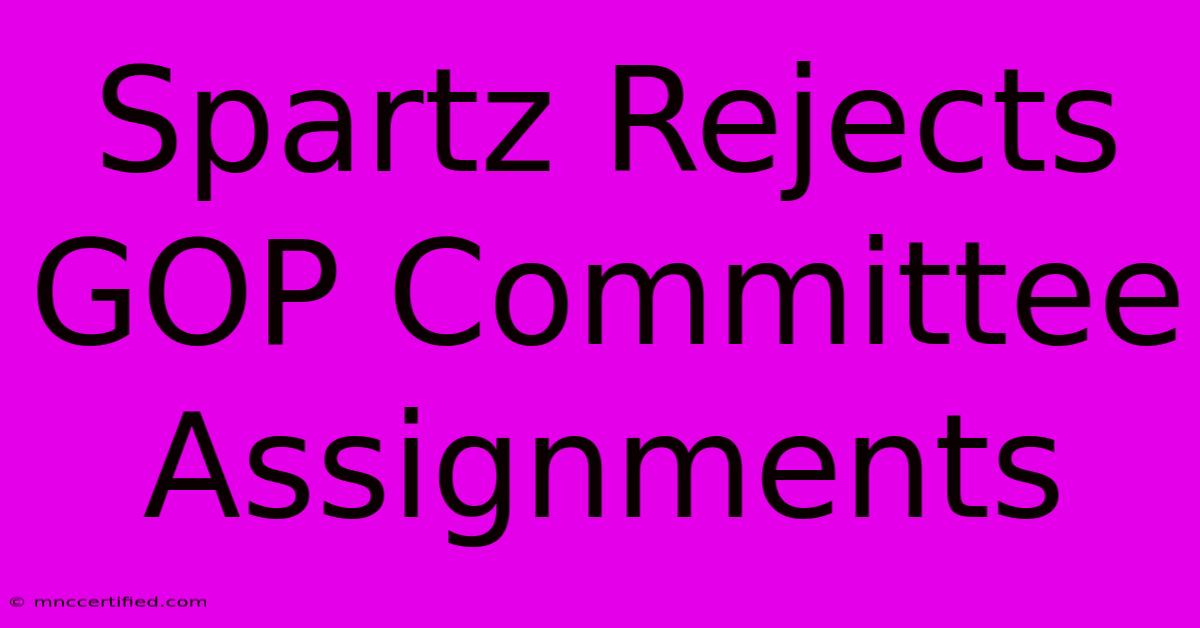Spartz Rejects GOP Committee Assignments

Table of Contents
Spartz Rejects GOP Committee Assignments: A Deep Dive into the Controversy
Republican Representative Victoria Spartz's rejection of her committee assignments has sparked significant debate and speculation within political circles. This move, while seemingly simple, carries weighty implications for both Spartz herself and the broader Republican party. This article delves into the reasons behind her decision, the potential consequences, and the ongoing discussion surrounding her actions.
Understanding the Context: Spartz's Committee Assignments
Spartz, representing Indiana's 5th congressional district, was offered seats on several House committees. While the specific committees haven't been publicly detailed in every instance, reports suggest they were largely within the purview of the Republican party's priorities. The rejection of these assignments represents a significant departure from the norm, raising immediate questions about her motivations.
The Significance of Committee Assignments
Committee assignments are crucial for a representative's ability to influence legislation and policy. Serving on relevant committees allows members to shape the legislative agenda, participate in hearings, and ultimately, cast votes on critical issues. Rejecting these positions, therefore, signifies a deliberate decision to limit one's influence within the legislative process.
Spartz's Rationale: Unveiling the Reasons
Spartz's official statements on the matter have been relatively vague, citing concerns about the party's direction and internal dynamics. However, numerous media outlets and political analysts have offered potential explanations, including:
-
Internal Party Conflicts: Reports suggest disagreements within the Republican party, possibly stemming from factionalism or differing ideological viewpoints. Spartz's rejection might signal her discontent with the current party leadership or specific policy directions.
-
Strategic Positioning: Some speculate that Spartz's move is a calculated strategic maneuver. By rejecting committee assignments, she gains a degree of independence, potentially enhancing her profile as a moderate voice within the Republican party or even positioning herself for a future leadership role.
-
Public Pressure and Dissatisfaction: The possibility exists that Spartz responded to pressure from constituents expressing dissatisfaction with certain aspects of the Republican agenda. Her decision could be seen as a response to demands for greater accountability or a departure from the established party line.
-
Concerns about Ukraine: Given Spartz's Ukrainian heritage and outspoken advocacy for Ukraine, some believe her decision might stem from disagreements regarding the Republican party's approach to the ongoing conflict.
The Consequences: Ripple Effects Across the Political Landscape
Spartz's actions are likely to have far-reaching consequences:
-
Weakened Republican Influence: Her refusal to participate in committee work directly diminishes the Republican party's collective influence within the House.
-
Increased Scrutiny of Party Leadership: Spartz's public rejection puts pressure on Republican leadership to address underlying issues and concerns within the party.
-
Shifting Political Dynamics: Her decision could reshape the power dynamics within the House, potentially empowering other moderate Republicans or leading to further internal conflict.
-
Impact on Indiana's 5th District: Her constituents will likely face decreased representation on specific committees, potentially affecting the district's legislative priorities.
The Ongoing Debate and Future Outlook
Spartz's rejection of her committee assignments remains a developing story, with many unanswered questions. Further investigation is needed to fully understand her motivations and the long-term consequences of her actions. The coming weeks and months will likely provide further clarity on this significant political event and its impact on the Republican party and the broader political landscape. This situation serves as a case study in the complexities of intra-party dynamics and the power of individual representatives to shape the course of legislation.
Keywords: Victoria Spartz, GOP, Republican Party, Committee Assignments, House Committees, Indiana, Congress, Political Controversy, Republican Factionalism, Ukraine, Legislative Influence, Political Strategy, Party Leadership
Off-Page SEO Considerations: Promoting this article through social media channels, engaging in relevant online forums and discussions, and building backlinks from reputable news sites and political blogs will significantly boost its visibility and search engine rankings.

Thank you for visiting our website wich cover about Spartz Rejects GOP Committee Assignments. We hope the information provided has been useful to you. Feel free to contact us if you have any questions or need further assistance. See you next time and dont miss to bookmark.
Featured Posts
-
Karate Kids Legends Trailer Debuts
Dec 18, 2024
-
Fathers Grief Janis Timmas Tragic Loss
Dec 18, 2024
-
Florida Rallies Past Unc Remains Unbeaten
Dec 18, 2024
-
Jaden Smiths Karate Kid Legends Appearance
Dec 18, 2024
-
Connolly Defeats Aoc In Oversight Bid
Dec 18, 2024